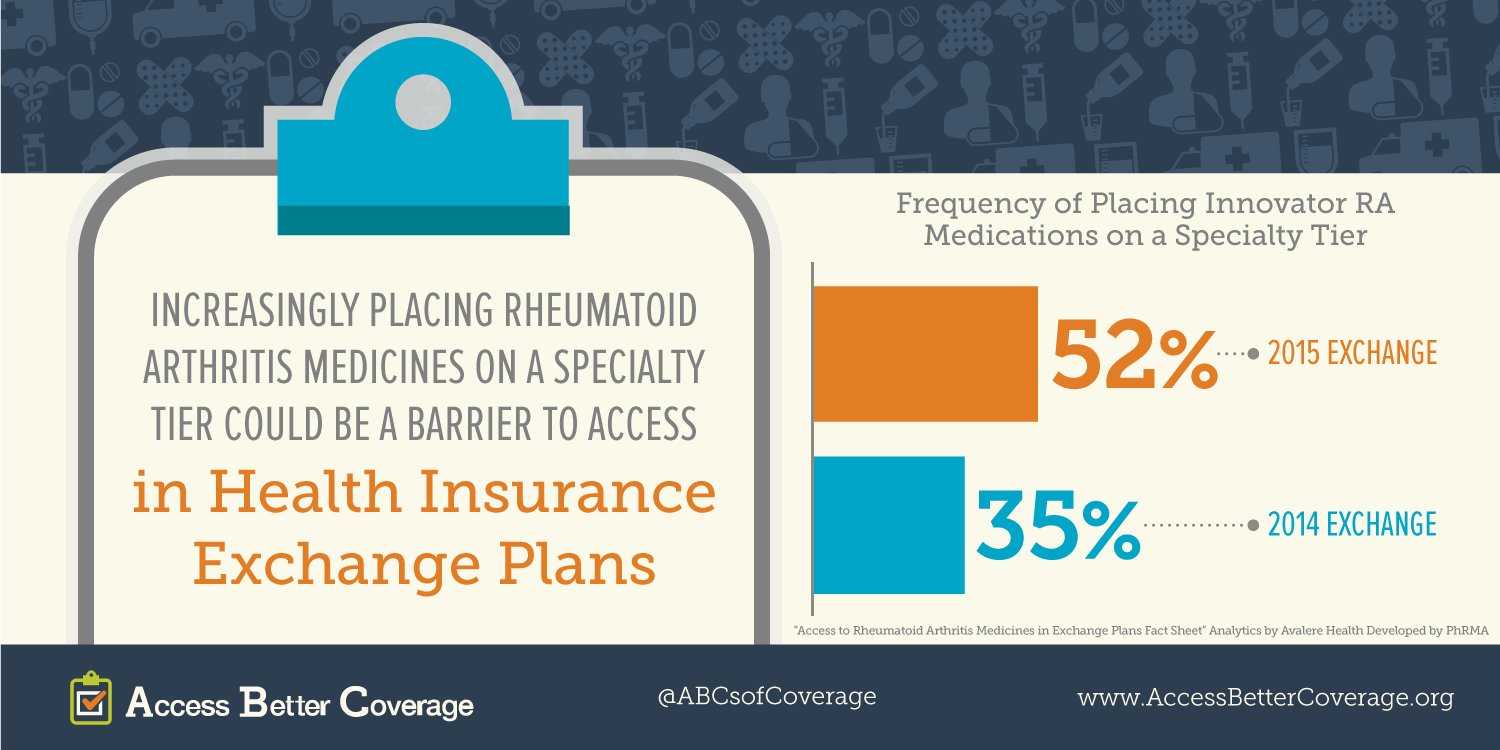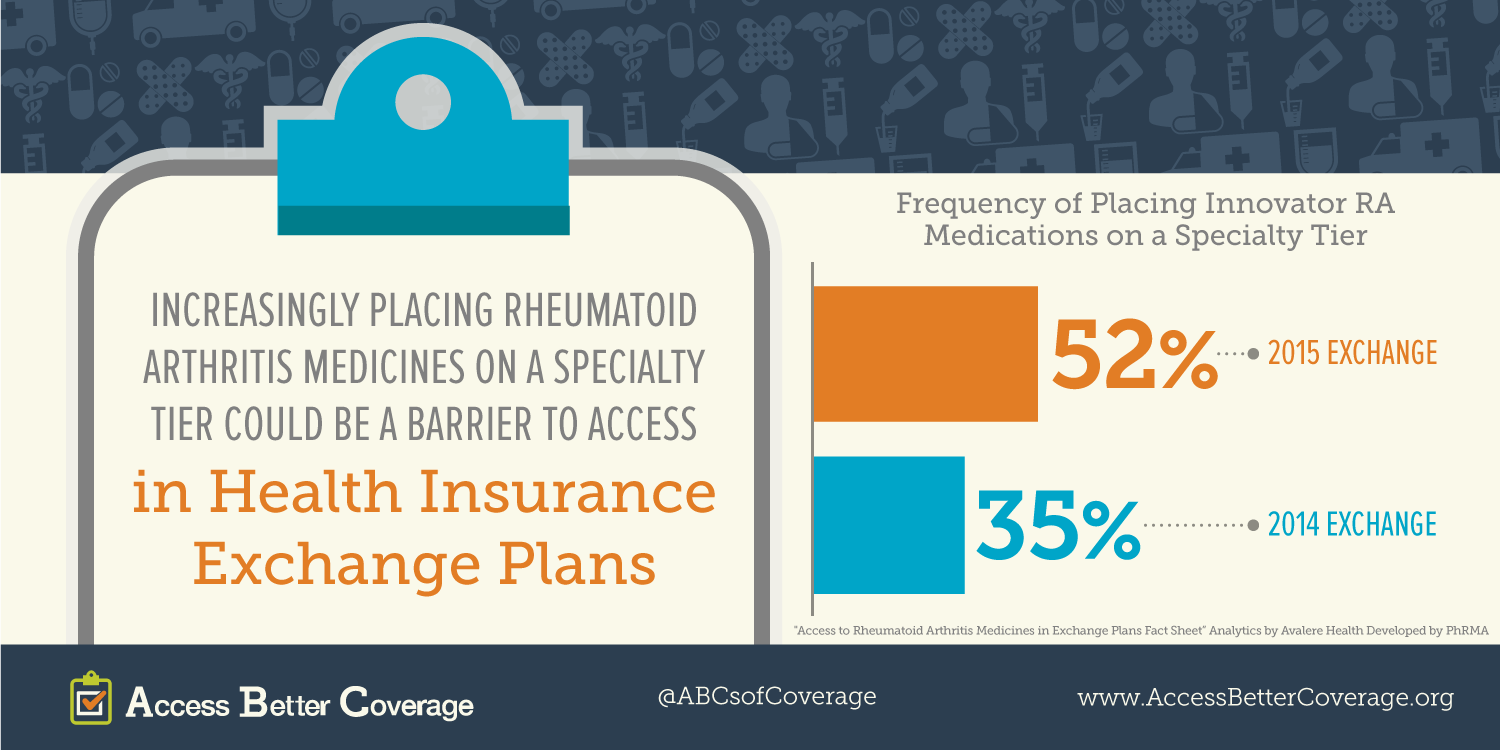 Patients, especially those suffering from chronic conditions, deserve access to the medicines they need to live longer, healthier lives. Today, PhRMA released a new fact sheet on access to rheumatoid arthritis medicines in exchange plans in 2015 (2014 fact sheet is available here). The fact sheet highlights some of the potential barriers to accessing needed treatments. Learn more on AccessBetterCoverage.org, in our patient profiles and our other fact sheets.
Patients, especially those suffering from chronic conditions, deserve access to the medicines they need to live longer, healthier lives. Today, PhRMA released a new fact sheet on access to rheumatoid arthritis medicines in exchange plans in 2015 (2014 fact sheet is available here). The fact sheet highlights some of the potential barriers to accessing needed treatments. Learn more on AccessBetterCoverage.org, in our patient profiles and our other fact sheets.
This is the last post in our 2015 Burden on Patients Q&A series with patient advocates. To learn more, we asked Virginia Ladd, president and executive director, American Autoimmune Related Diseases Association (AARDA) to answer a few questions.
Question: What is AARDA and who do you represent?
Answer: The American Autoimmune Related Diseases Association (AARDA) is the only national nonprofit health agency dedicated to bringing a national focus to autoimmunity, a major cause of serious chronic diseases. It is estimated that approximately 50 million Americans suffer from autoimmune diseases.
Difficult to diagnose and often confused with other diseases, autoimmune conditions take a severe toll upon the lives of patients and their families as well as on the health care economy. Education, advocacy, and research are the most important tools in fighting autoimmune disease. To that end, AARDA devotes significant time and resources toward:
- Funding basic research into the causes and mechanisms of autoimmunity;
- Developing materials and events to increase awareness about autoimmune disease among health care providers, the community of patients, and the general public; and
- Serving as the voice of advocacy in public policy matters affecting the interest and wellbeing of autoimmune patients.
Q: How do medicines help patients manage and treat autoimmune diseases like rheumatoid arthritis?
A: For many patients with autoimmune diseases like rheumatoid arthritis (RA), obtaining a diagnosis can be a lengthy and even excruciating process involving many doctor visits, extensive testing and false starts. And unfortunately, with far too many autoimmune and other rare disorders, effective treatments have not been discovered. With RA, however, there are powerful new and effective medicines available, medicines which can literally change patients' lives. Relief from pain, control over the continuing ravages of the disease – these are what all patients need and want – no matter what condition they have. It's also important to note, especially in a circumstance like discovery of the new biologic medicines which are being used effectively with RA, that their discovery also brings new hope to patients with autoimmunity that treatments for their illnesses may soon be found.
Q: The Affordable Care Act (ACA) expanded health insurance coverage to a broader population. What are you hearing about coverage in health insurance exchanges, in particular access to autoimmune diseases like rheumatoid arthritis?
A: AARDA strongly supports all measures which provide patients with access to needed care and medicine; however, we know that there are difficulties for patients who have rare and/or complicated diseases.
For them, their diagnosis and treatment depends upon access to specialists, tertiary care facilities and cutting edge treatments. We remain concerned that limited provider networks and formularies create significant barriers for autoimmune patients and others with chronic, multiple and difficult-to-diagnose illnesses.
For some time, AARDA has participated in coalitions and advocacy initiatives with other patient groups to protect and expand this needed access for our communities. We will continue to do so because patients’ lives truly do depend upon it.

Q: What are the biggest concerns facing patients with RA in health exchanges?
A: For patients with RA and other autoimmune diseases, having coverage which provides access to specialists is essential. In studies AARDA has conducted, we found over and over again that medicines used to treat diseases like RA and other complex autoimmune diseases are almost exclusively prescribed only by specialists because family physicians are not trained in the use of these complex therapies. So access to these specialists and the facilities where they practice is critically important, because without them, there is no access to the medicines that only they will prescribe.
Q: Is there anything else we missed?
A: Many autoimmune patients, like patients who suffer from rare diseases of all types, live in a world in which there is no cure – or in some cases, treatment for their condition. Every new discovery and even every new improvement in treatment brings renewed hope that progress will lead to cures.
That being said, there is nothing more horrible, demoralizing or hurtful than knowing that treatment is available but having no access to them. Patients wait and hope for new discoveries, but those discoveries are of no help unless patients can access them.
Networks of providers need to include specialists who treat rheumatoid arthritis and other autoimmune disease specialists because only then can patients get the care they need and formularies needed to provide access to disease modifying cutting edge medicines.



 Patients, especially those suffering from chronic conditions, deserve access to the medicines they need to live longer, healthier lives. Today, PhRMA released a
Patients, especially those suffering from chronic conditions, deserve access to the medicines they need to live longer, healthier lives. Today, PhRMA released a 
